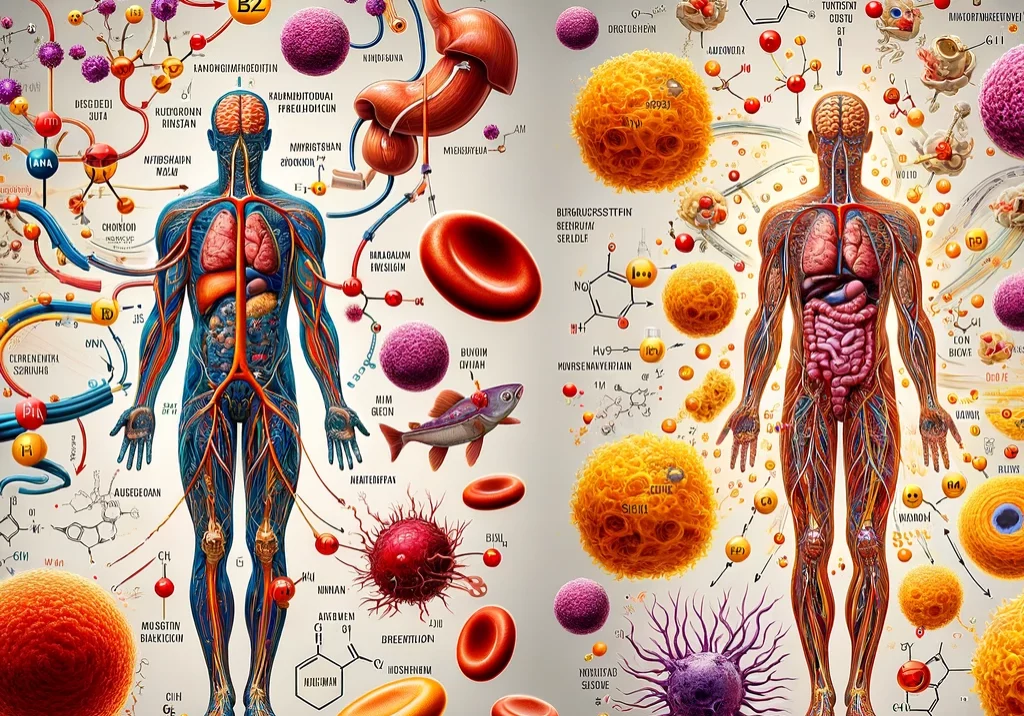
The Biochemical Significance of Vitamin B12 in Human Health
Vitamin B12, a crucial nutrient in the human diet, plays an indispensable role in various cellular processes, including DNA synthesis, red blood cell formation, and the functioning of the nervous system.
Unlike other vitamins, B12's complex structure and its unique mechanisms of action have profound implications for human health. This page explores the intricate workings of Vitamin B12, shedding light on how it facilitates essential biochemical reactions within the body.
Vitamin B12 and Its Role in Methylation Processes
One of Vitamin B12's critical functions is its involvement in methylation, a biochemical process essential for DNA synthesis and repair, gene expression, and the metabolism of fats and proteins.
Methylation involves the transfer of a methyl group (one carbon atom attached to three hydrogen atoms) to various substrates, including DNA, proteins, and neurotransmitters. Vitamin B12 acts as a cofactor for methionine synthase, an enzyme that methylates homocysteine to form methionine, an amino acid used in the synthesis of proteins and other important molecules like S-adenosylmethionine (SAMe).
SAMe serves as a methyl donor in numerous methylation reactions, influencing gene expression, neurotransmitter synthesis, and the integrity of cellular membranes.
Energy Production and Mitochondrial Function
Vitamin B12's role in energy production is closely linked to its function in the metabolism of fatty acids and amino acids. It is a cofactor for the enzyme methylmalonyl-CoA mutase, which is involved in converting methylmalonyl-CoA to succinyl-CoA, a critical step in the breakdown of certain fatty acids and amino acids for energy.
Succinyl-CoA is a component of the citric acid cycle (Krebs cycle), a fundamental pathway in cellular respiration that generates ATP, the energy currency of the cell. Through its participation in these metabolic pathways, Vitamin B12 supports mitochondrial function and energy production, enabling cells to perform their essential activities.
Nervous System Support and Myelin Synthesis
Vitamin B12 plays a pivotal role in the maintenance and repair of the nervous system. It is essential for the synthesis of myelin, the protective sheath that surrounds nerves and facilitates the rapid transmission of electrical impulses between the brain and other parts of the body.
A deficiency in Vitamin B12 can lead to demyelination, the breakdown of myelin, disrupting nerve signal transmission and leading to neurological disorders such as peripheral neuropathy and, in severe cases, degenerative brain diseases.
By supporting myelin synthesis, Vitamin B12 helps maintain the integrity of the nervous system and promotes optimal neurological function.
Contribution to Red Blood Cell Formation
The synthesis of red blood cells (erythropoiesis) is another critical process dependent on Vitamin B12. It works in tandem with folate to synthesize DNA and RNA, necessary for the rapid cell division and growth of precursor cells in bone marrow that eventually become red blood cells.
A lack of Vitamin B12 disrupts DNA synthesis, leading to the production of large, immature, and poorly functioning red blood cells, a condition known as megaloblastic anemia. This condition results in insufficient oxygen transport throughout the body, causing fatigue and weakness.
Conclusion
Vitamin B12's multifaceted roles in the body underscore its importance in maintaining human health.
From supporting methylation processes that regulate gene expression and neurotransmitter synthesis to facilitating energy production and ensuring the proper formation of red blood cells and myelin, Vitamin B12's biochemical functions are integral to life. Understanding these mechanisms highlights the critical need for adequate Vitamin B12 intake through diet or supplementation, especially for individuals at risk of deficiency.
By ensuring we meet our body's needs for this vital nutrient, we support our overall health and well-being, from the cellular level up.
Unlocking the Biochemical Power of Vitamin B12
Explore the intricate roles of Vitamin B12 in methylation, energy production, nervous system support, and red blood cell formation, highlighting its biochemical significance and vital contribution to overall human health.
